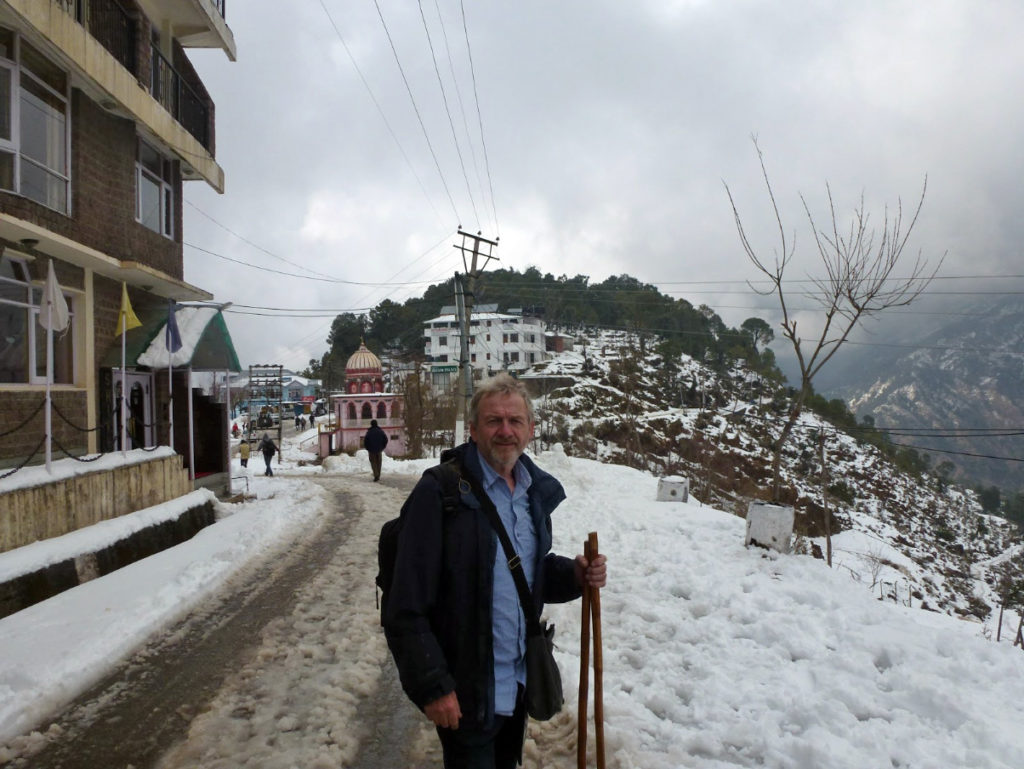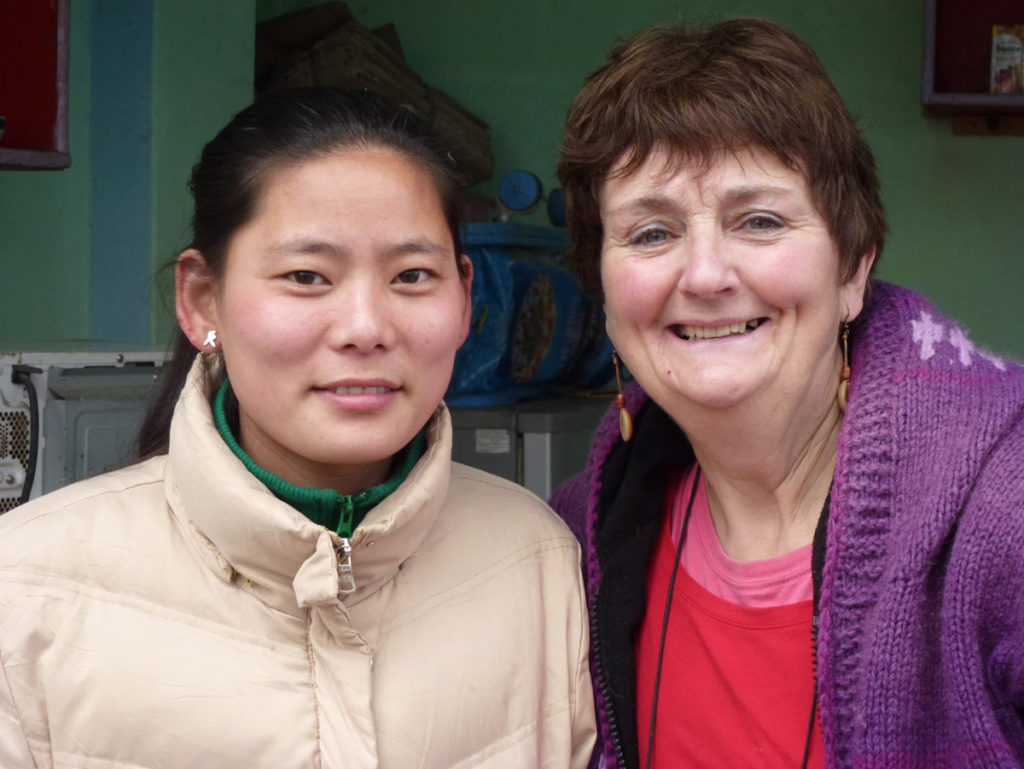By Annie Quinn
We had travelled from Kildorrery early in December, to do voluntary work, teaching English to the Tibetan people in Northern India and had already enjoyed three weeks in the tiny mountain village of Mcleod Ganj, whose picturesque setting is only out-shone by the fact that it is the home of His Holiness, the Dalai Lama.
Set on the side of one of the many foothills of the Himalayas, with colourful valleys and tiny hamlets all around, and against a back-drop of snowy-white peaks, it is comprised of one winding steep road, wide enough for just a single vehicle, with only two small lanes leading off.
Each road is lined with various small businesses, craft shops run by people from Kashmir in the North, restaurants, small coffee shops and a plethora of colourful clothing, knitwear and accessory shops, which are carefully tended by Tibetan locals.
The indigenous, quiet Indian folk seem to be overshadowed by the very busy presence of the large Tibetan community, which has slowly settled here, as increasing numbers continue to escape Chinese oppression, by trekking hazardous routes over high mountain ranges, through deep snow and ice.
Being a nomadic race, they are well-used to this hardship but many lives have been lost in the quest for the freedom of a new and very different life in India.
Parents have sometimes decided to allow their children to travel over the border with trusted groups, while they themselves had to remain in Tibet. Communication restrictions are such that many of our students could not send letters home or even make ‘phone calls.
This sad situation was kept well-hidden by the happy disposition of the refugees we befriended, who always greeted us with beaming smiles and physical contact … a hand on our arm or around our shoulder while we chatted, the young women being mostly reticent, compared to their more confident male counterparts.

Only occasionally, when writing in their notebooks, did one or two of them mention their continuing sadness for parents and siblings left behind in Tibet. They had formed new ‘families’ and enjoyed a great sense of community, either living in apartments or shared dwellings, finding employment locally, often in the catering trade or in shop work, enabling their dedicated studies to be followed part-time.
We befriended a young Tibetan cake-seller (cakes are a big and alarmingly-colourful part of life here, delivered fresh, early each morning). She stood in her small cabin on a busy street, amidst craft shops, clothes traders and market stalls. Her coconut sponge was to die for, alongside doughnuts covered in melted chocolate. A meal could be found in a cake … and often was.
She was keen to tell us about her part-time language studies, but on each occasion she asked us more about ourselves and our country, obviously becoming more intrigued by what she heard, until one day she said, “But you are so old!”. We thought she was trying to tell us that we were young for our age and that she was merely confusing her words. “No”, she insisted, “You are OLD!”.
Finally, we managed to grasp her thoughts. In India, people over the age of fifty sit at home and take it easy. They do not exercise or travel around. When she heard our story fully she was amazed, saying that, when a Tibetan person is widowed, or left living alone, they always remain alone. Taking a second partner is simply not an option … ever.
Each time we bought a cake, she would grin delightedly and mutter things about our being “So old!” and told us that, at nineteen years of age, she was “far too young to have a boyfriend!” Her welcoming smile lit up the colourful cabin and her innocent curiosity about the rest of the world was a joy to see.
Although December nights can be very cold in Northern India, warm sunshine was a great comfort most days so we often enjoyed a roof-top lunch when our morning classes were over. If you found yourself in the shade at three o’clock you would start to wrap-up, a process which continued indoors, layer upon layer (a colourful sight to behold) until your head hit the pillow.
There was, at that time, a strategy in place to conserve power. The planned schedule of power cuts meant you had to be prepared. Sometimes a black-out would come unexpectedly, as in the time when we were mid-film at the village ‘cinema’ (where a young Indian man used a DVD player to provide big screen entertainment at a very modest price). We had been advised to take sleeping bags to sit in but we found the sparsely-converted basement warm enough. We were the only two customers that night for a newly-released film and sat, contentedly cosy, until an unexpected loss of power found us gazing at a blank screen!
Having to admit, after ten minutes sitting with our fingers crossed, that “that was it”, we left with the consolation of free tickets for another evening. The day we did return, we found the door locked. Seemingly, if no patrons appeared at opening time our young entrepreneur closed the door and went home. We must have been just a minute too late. Happily, the same gripping film was on offer on the plane homeward … a well-deserved reward!
That was a Friday night, the start of our free weekend, and heavy monsoon-type rain had fallen incessantly throughout the day, but a dazzling layer of crisp dry snow surprised us at 10pm, when we climbed the steps out of the cinema. Three inches had fallen already, so we linked arms tightly and steeled ourselves for the very steep downward slope home, on the dubiously-laid pavements.

STATE OF BEWILDERMENT
The local dog population, well-fed and cared for, who relax haphazardly and stupefied, day in day out on the roadside, seemed to be in a state of bewilderment. With no place to lie and watch the world go by … they were creeping home early, hoping to find a dry, warm corner for the night.
Later on, an eerie quiet settled across the valleys; not a sound could be heard. There was none of the distant chorus-barking, which usually started around midnight and lasted for three hours and was, perhaps, a ritualistic statement from the dogs, that this was their village, which they were minding for the sleeping humans. We guessed that the blanket of deep snow was muffling the sounds which usually disturbed them. They were silent and sleeping well.
As we had done very little exercise of late, owing to a recurring tummy problem which had rendered Ed very sick indeed, and then left him very weak, we had decided to spend the Saturday walking by road to a nearby village, commonly known, perhaps alluringly, as ‘The Resorts’. It lay four miles away, uphill, looking down on us in our humble valley from its grandiose position, seducing us, by its inviting name and by its tall dark conifers proudly poking their snow-tipped heads towards the blue sky.
We were so looking forward to the luxury of a night in a cosy hotel in an up-market area, and to exploring the white landscape, the valleys and the wooded slopes. We needed a change of scene for a night and a chance to wallow in comfort, before treading the downward route home, on the Sunday.
Taking small back-packs we headed off in early morning sunshine. We’d packed our own prized kettle, tea, coffee, milk and sugar. Electricity cuts in mind, we had torches for the hand, and for the head (an invention that has to be tried to be truly valued), a very messy miniature but useful Scrabble game and our well-loved kindles. Content with the added security of our bamboo walking poles we felt well-prepared for the expedition, followed by the reward of a little holiday.
SLOW PROGRESS
The road was steep but manageable but as it wound its way upward the snow became deeper and our progress slower. Strangely, as we gained height, the number of cars was increasing, drenching us as they sped by at their normal speed, undeterred, without signs of any trepidation regarding skidding or bumping.
By mid-morning motorists and motorcyclists were coming out in force, as were their colourfully-clad, strolling audience, to enjoy the excitement and the challenges which the recent weather was offering, revelling in the slushy mess, like children in a school playground. The normal level of constant Indian horn-beeping became louder, clearly insisting that pedestrians keep off the roadway – a scary threat, given that sidewalks in India are far less than perfect, peppered with uncovered drains, sudden gaps and steep sharp edges. Camouflaged by snow they were now even more hazardous.
Poking our way ahead, testing the ground with our sticks, we were given no time at all to jump to one side: the road was no longer ours. Its hairpin bends and undulating circuits now belonged to these foolhardy rally drivers.
The pavement was ours indeed, but I did not welcome the challenges it presented. I was becoming tired, physically and mentally, my ears aching from the persistent sounds of revving, skidding and honking. I am not as tolerant as my ever-patient hubby. I detest any lack of democracy. We already knew that pedestrian/driver compatibility is non-existent in India, but I began to question, angrily, whether any common sense prevailed here at all, or any awareness of safety.
One driver, in a huge shiny new car, held his hand on the horn for several minutes, as he sped through mounds of white slush, showering a freezing cascade onto local ladies, who smiled and giggled, gathering up their multi-coloured Saturday best from their ankles. I had already found most Indian ladies to be very smiley, looking for eye contact with other women, even tourists. It is a heart-warming thing to see, as though they wish to send out an acknowledgement of our sisterhood. Today, however, I was not responding. I was tired, wet and morose, and a little guilty for my bad mood.
We heard that this was the first snowfall of the winter and quite unexpected, the weather having been much warmer than usual. People were delighted and had left their homes to enjoy all that it had to offer, even if it meant a drenching. Children played on the flat roof-tops, throwing snowballs at pals below, but we only spotted one snowman, a reminder that our two cultures differ in so many ways.
At the highest point the drivers were facing a bigger challenge, many having been forced to give up and go back down, the way they had come. Cars were becoming stuck, their wheels fighting for grip in snowdrifts, or parked-up in the deep soft gaps of the newly-filled gutters. Families stopped in groups, giving encouragement, whilst motorists tried to turn around on the steep, narrow hills. We wondered at the courage and the sanity of the undeterred motor-cyclists, as they put down their feet to keep their balance, skidding with glee amidst the passing vehicles.
I looked up for a second from my wary and weary feet to find a man was barring our way; he was sporting a professional-looking camera and demanded a photograph … then another photo … and another. He had no English but it was clear that he was a local newsman. Curiosity softened me a little so I asked for the name of his publication, but we were no wiser, his strong Indian accent rendering it impossible for us to even guess at the title he mentioned. Sadly, we did not revisit, in print, the proof of our bedraggled-looking rise to local tourist fame!
Trudging on, Ed, still amused, happily stepped aside to give way to two huge snow-ploughs, which were the first indication of any acknowledgement that the situation should, in fact, be tackled municipally.
At last we reached our goal: the village of Nadir, a well-chosen name indeed, only for us to discover that it was, mainly, still under construction. A few old-looking hotels existed but were closed, shut-up completely and many half-built shells of similar buildings looked out across the beautiful scenery from their blank and unwelcoming facades.
Then, amidst our disappointment, a brightly-painted and posh-looking hotel beckoned to my tired bones from a nearby hill-top. Ed was very unsure but, being caring and protective as always, he followed my weary shape, to climb a precarious flight of ice-covered concrete steps which wound promisingly upwards through terraced gardens.
An inviting reception area greeted us, but the faces of the two miserable-looking men within belied the décor … with a vengeance! Prices were discussed and then we were led, in silence, across the surroundings and up and down dilapidated slippery steps. Our anticipation slowly dampening, Ed suddenly realised that we had committed the most heinous sin. We had left our passports … an absolute prerequisite to a stay in any accommodation in India … at our B&B!
SPIRITS DROPPED
My weary body and mind refused to accept what this whispered news might portend. My spirits dropped in an instant, but desperation fired my optimism. Our oversight proved to be a blessing indeed when we entered the hotel room. We were nonplussed! It was cold, damp and uninviting to a degree, with a very meagre ‘bathroom’, the windowsills crumbling with wet rot, on the inside. The asking price was double what we were paying for our spacious room and pleasant bathroom in our cosy guest-house, down in the valley.
I was too tired to admit that it was not good enough but, fortunately, our lack of passports brought a refusal from the non-smiling proprietors. After their final and very firm “No!” we hobbled down the slippery steps again and, once on the homeward road, I managed to cheer up, Ed making light of the experience, while we both counted our blessings that we had not taken such third-rate accommodation, and at such a disgraceful price.
The way down was not as hairy as we had expected. Much of the snow had melted, so we reached our own village in just over an hour, having spent two hours climbing upwards. We nipped home to rid ourselves of rucksacks, wet boots and socks, then up the lane we went, our tummies rumbling at the anticipation of a lovely meal in the local Tibetan hotel, which offered a variety of international dishes and even the extra treat of a beer or two, or a rum and coke … cosmopolitan indeed!
The welcome of the warm interior was heightened by the smiling faces of the staff. A menu was speedily brought, along with a traditional Indian starter and soon we were tucking into an array of delicious food of various degrees of spicy-ness, with ice-cream to follow, to soothe the burning tongues. We lingered long, replete after the day’s exertions.
Well-fed and well-watered, we wandered happily down to our beds, Ed singing uninhibitedly, all the way home! We had learned, to our betterment, that the grass is not always greener on the other side!







